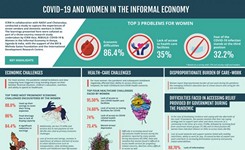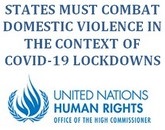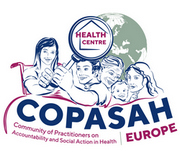
Why Covid-19 recovery must be gender-responsive - CORE (c19re.org)
The majority (61 per cent) of the world’s workforce is informally employed. In many developing countries, women are especially likely to be informally employed and are more often found in the most vulnerable forms of employment with lower earnings in comparison to men. New research highlights how the Covid-19 pandemic has exacerbated women informal workers’ precarious employment conditions.
Direct Link to Full 42-Page Report: Rebuild_Scoping-Report_January_2021.pdf (icrw.org)
Economic and health-care challenges faced by street vendors and domestic workers in Delhi. Women in Urban Informal Work and Covid-19 in India: A REBUILD Scoping Report, ICRW (2022)
Our findings below present some of key problems impacting women informal workers.
- Women workers reported loss of employment and wages, depletion of savings, food insecurity, and massive increases in borrowings to overcome the losses.
- Access to reproductive health services, particularly delivery- and abortion-related services, was affected severely due to restrictions on mobility and rerouting of health workers for Covid-19 management. Large parts of the population relied on overburdened health workers to disseminate health care for women on ground.
- While women spoke about domestic violence as a normalised and regular occurrence in their lives, there was an increase in violence during the pandemic. In addition, mobility restrictions, lack of support systems and prioritisation of the Covid-19 response further inhibited access to GBV services.
- Women’s unpaid care burden increased considerably owing to closure of schools, increased burden of caring for the sick and elderly at home, and overall greater household demands.
- Increase in episodes of domestic violence, growing loneliness due to social confinement, disproportionate share of household work, and minimal interaction with social support network aggravated psychological turbulence among women workers.
- While women were facing challenges in different realms, the policy response focused primarily on ensuring food security. Moreover, access to free rations through e-coupons required access to smart phones which many did not have and hence, free rations could not always reach the intended populations. Cash transfers, due to the pre-existing gaps in the coverage of the schemes and the severity of the economic distress caused by the pandemic, did not have the desired effect. Having said that, among all the relief and recovery measures announced, food security was still found to be important for the urban poor.
These findings highlight a need to not only minimize the spread of the pandemic but also protect the livelihoods of women informal workers, counter food insecurity, and enable access to quality healthcare. This could include greater efforts to create formal livelihood options for women workers and provide social protection mechanisms for their economic rehabilitation and overall well-being.
Source: WUNRN – 20.04.2023






























